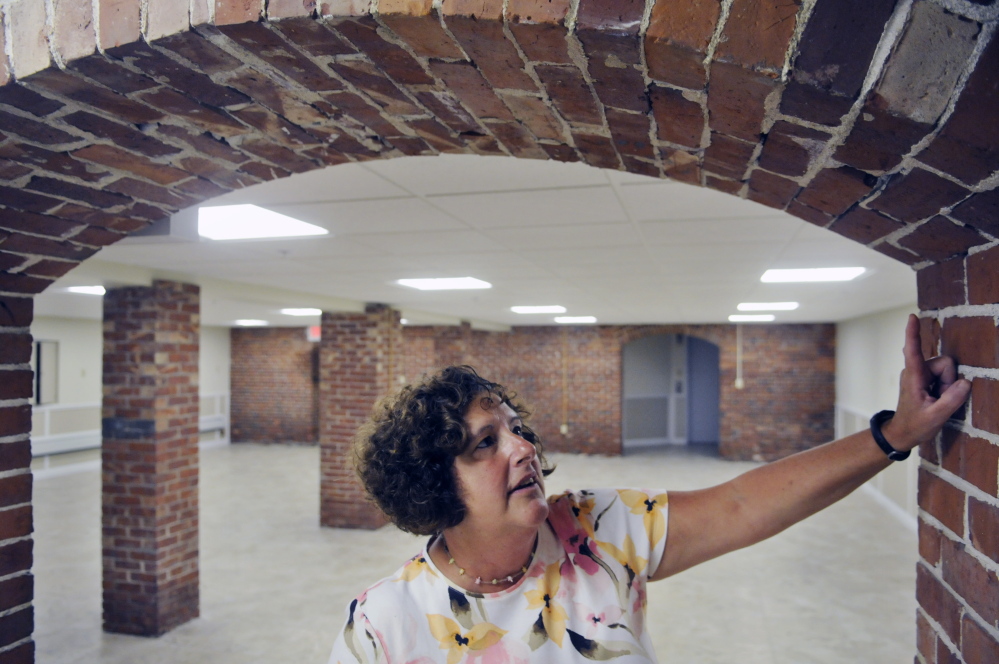A review of the Gardiner Public Library by a consultant who evaluated the city’s major services included suggestions to make the library more efficient, but city officials say some of the recommendations aren’t practical or wouldn’t save money.
Other recommendations, including shifting hours to accommodate more of the working population and revising the cost formula for member communities, are ideas that the library’s leadership already has begun evaluating or will evaluate, said Anne Davis, director of the library.
The consultant, New Hampshire-based Municipal Resources Inc., looked at the library as part of its review of four city services: the fire and police departments, the library and the Public Works Department. The report, which cost the city about $25,000, will be discussed at Wednesday’s 6 p.m. City Council meeting and will be the subject of a public hearing scheduled for 6 to 9 p.m. Sept. 16 at the Boys & Girls Club of Greater Gardiner.
City councilors voted near the end of last year to hire a consultant to review the city’s major services. Part of the 175-page report compares the city’s services and costs to similar or nearby communities, and the consultant offered recommendations or suggestions for each of the four departments.
Consultants who worked on the report are expected to be at both the council meeting and the public hearing to present their findings and answer questions.
Along with Gardiner, the Gardiner Public Library serves the towns of Farmingdale, Litchfield, Pittston, Randolph and West Gardiner. Except for Farmingdale, which rejoined the service this year at a discounted annual rate of $4,500 for the next two years, the communities pay $17,000 to $35,000 a year to allow their residents to use the library without having to pay a fee. Of the roughly $380,000 in funding for the operation of the library, the city of Gardiner pays around $290,000, according to the report. The library building is owned and maintained by the Gardiner Library Association, a nonprofit organization.
The amounts the other communities pay is calculated based on the number of items checked out by residents in the towns, but the report recommends changing that to a population-based formula.
Davis said she hopes the library’s board of trustees can develop a new formula that is similar to that of the city’s ambulance service. Communities’ ambulance fees are determined by a combination of population and usage. Because not everyone who uses the library checks out books or other items — some people go to use the wireless Internet, computers or periodicals — Davis said she’d like to find a fairer way of calculating use.
“At the end of the day, we are a community center, and I just think people don’t understand how important the space is for some people,” she said.
Even though city councilors previously have expressed interest in moving the city away from picking up the bulk of the tab for the library, Davis said the question of whether to charge the other communities more can be a juggling act. She said she understands councilors’ concerns that the other communities aren’t paying equal shares of what it costs to run the library, but there’s a danger that some communities will drop the library if the cost becomes too expensive.
That’s why the library has made an effort to bring more towns into the service, Davis said. If more towns join, the costs could be spread out over a larger base.
Davis said some other recommendations in the report wouldn’t work for the library or would cost more money. The report recommends eliminating the part-time archivist position, which oversees the library’s archives room. Cutting the position would mean the archives room, undergoing a more-than-$100,000 renovation, would be closed to the public.
Cutting the archivist position and closing the room would be a “terrible loss,” Davis said. There is a lot of interest in history and genealogy from a variety of the people in the region, she said.
Another recommendation, leasing copies of popular books and other materials, would cost the library more money, Davis said. The report recommended it to supplement the libraries declining materials budget, but Davis said the library typically buys only one copy of each book.
A recommendation to outsource the tasks Davis does as the city’s information technology coordinator also would cost the city more than Davis’ $8,000 stipend for the position, City Manager Scott Morelli said. The city outsources most of its information technology work to Gardiner-based A Partner in Technology, and Davis handles minor problems, Morelli said.
The most drastic idea in the library report — outsourcing the entire operation to a private firm — was considered but not recommended by the consultant. The report noted that a popular library management company, Library Systems & Services, LLC, doesn’t run any libraries in New England and most are county library systems.
Davis said she’s never heard of any outsourced libraries in New England.
“Maine libraries are so beloved in the community,” she said. “I think you’d carve out the heart of the city and the library.”
Paul Koenig — 621-5663
Twitter: @pdkoenig
Send questions/comments to the editors.




Success. Please wait for the page to reload. If the page does not reload within 5 seconds, please refresh the page.
Enter your email and password to access comments.
Hi, to comment on stories you must . This profile is in addition to your subscription and website login.
Already have a commenting profile? .
Invalid username/password.
Please check your email to confirm and complete your registration.
Only subscribers are eligible to post comments. Please subscribe or login first for digital access. Here’s why.
Use the form below to reset your password. When you've submitted your account email, we will send an email with a reset code.